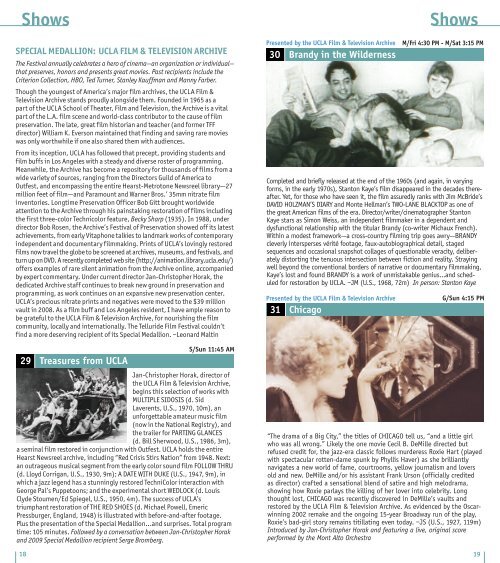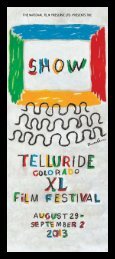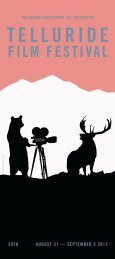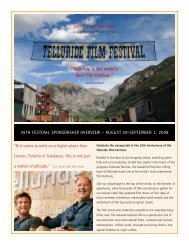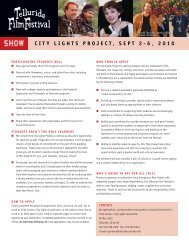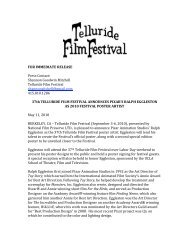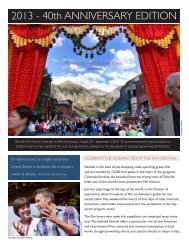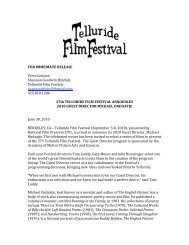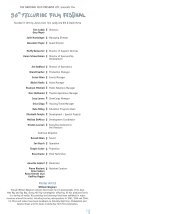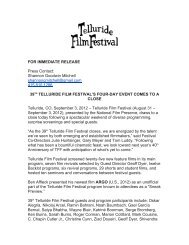Publications Editor Prized Program Contributors Tribute Curator
Publications Editor Prized Program Contributors Tribute Curator
Publications Editor Prized Program Contributors Tribute Curator
You also want an ePaper? Increase the reach of your titles
YUMPU automatically turns print PDFs into web optimized ePapers that Google loves.
Shows<br />
SPECIAL MEDALLION: UCLA FILM & TELEVISION ARCHIVE<br />
The Festival annually celebrates a hero of cinema—an organization or individual—<br />
that preserves, honors and presents great movies. Past recipients include the<br />
Criterion Collection, HBO, Ted Turner, Stanley Kauffman and Manny Farber.<br />
Though the youngest of America’s major film archives, the UCLA Film &<br />
Television Archive stands proudly alongside them. Founded in 1965 as a<br />
part of the UCLA School of Theater, Film and Television, the Archive is a vital<br />
part of the L.A. film scene and world-class contributor to the cause of film<br />
preservation. The late, great film historian and teacher (and former TFF<br />
director) William K. Everson maintained that finding and saving rare movies<br />
was only worthwhile if one also shared them with audiences.<br />
From its inception, UCLA has followed that precept, providing students and<br />
film buffs in Los Angeles with a steady and diverse roster of programming.<br />
Meanwhile, the Archive has become a repository for thousands of films from a<br />
wide variety of sources, ranging from the Directors Guild of America to<br />
Outfest, and encompassing the entire Hearst-Metrotone Newsreel library—27<br />
million feet of film—and Paramount and Warner Bros.’ 35mm nitrate film<br />
inventories. Longtime Preservation Officer Bob Gitt brought worldwide<br />
attention to the Archive through his painstaking restoration of films including<br />
the first three-color Technicolor feature, Becky Sharp (1935). In 1988, under<br />
director Bob Rosen, the Archive’s Festival of Preservation showed off its latest<br />
achievements, from early Vitaphone talkies to landmark works of contemporary<br />
independent and documentary filmmaking. Prints of UCLA’s lovingly restored<br />
films now travel the globe to be screened at archives, museums, and festivals, and<br />
turnuponDVD.Arecentlycompletedwebsite(http://animation.library.ucla.edu/)<br />
offers examples of rare silent animation from the Archive online, accompanied<br />
by expert commentary. Under current director Jan-Christopher Horak, the<br />
dedicated Archive staff continues to break new ground in preservation and<br />
programming, as work continues on an expansive new preservation center.<br />
UCLA’s precious nitrate prints and negatives were moved to the $39 million<br />
vault in 2008. As a film buff and Los Angeles resident, I have ample reason to<br />
be grateful to the UCLA Film & Television Archive, for nourishing the film<br />
community, locally and internationally. The Telluride Film Festival couldn’t<br />
find a more deserving recipient of its Special Medallion. –Leonard Maltin<br />
29 Treasures from UCLA<br />
Jan-Christopher Horak, director of<br />
the UCLA Film & Television Archive,<br />
begins this selection of works with<br />
MULTIPLE SIDOSIS (d. Sid<br />
Laverents, U.S., 1970, 10m), an<br />
unforgettable amateur music film<br />
(now in the National Registry), and<br />
the trailer for PARTING GLANCES<br />
(d. Bill Sherwood, U.S., 1986, 3m),<br />
a seminal film restored in conjunction with Outfest. UCLA holds the entire<br />
Hearst Newsreel archive, including “Red Crisis Stirs Nation” from 1948. Next:<br />
an outrageous musical segment from the early color sound film FOLLOW THRU<br />
(d. Lloyd Corrigan, U.S., 1930, 9m); A DATE WITH DUKE (U.S., 1947, 9m), in<br />
which a jazz legend has a stunningly restored TechniColor interaction with<br />
George Pal’s Puppetoons; and the experimental short WEDLOCK (d. Louis<br />
Clyde Stoumen/Ed Spiegel, U.S., 1950, 4m). The success of UCLA’s<br />
triumphant restoration of THE RED SHOES (d. Michael Powell, Emeric<br />
Pressburger, England, 1948) is illustrated with before-and-after footage.<br />
Plus the presentation of the Special Medallion…and surprises. Total program<br />
time: 105 minutes. Followed by a conversation between Jan-Christopher Horak<br />
and 2009 Special Medallion recipient Serge Bromberg.<br />
18<br />
S/Sun 11:45 AM<br />
Presented by the UCLA Film & Television Archive<br />
30 Brandy in the Wilderness<br />
31 Chicago<br />
Shows<br />
M/Fri 4:30 PM - M/Sat 3:15 PM<br />
Completed and briefly released at the end of the 1960s (and again, in varying<br />
forms, in the early 1970s), Stanton Kaye’s film disappeared in the decades thereafter.<br />
Yet, for those who have seen it, the film assuredly ranks with Jim McBride’s<br />
DAVID HOLZMAN’S DIARY and Monte Hellman’s TWO-LANE BLACKTOP as one of<br />
the great American films of the era. Director/writer/cinematographer Stanton<br />
Kaye stars as Simon Weiss, an independent filmmaker in a dependent and<br />
dysfunctional relationship with the titular Brandy (co-writer Michaux French).<br />
Within a modest framework—a cross-country filming trip goes awry—BRANDY<br />
cleverly intersperses vérité footage, faux-autobiographical detail, staged<br />
sequences and occasional snapshot collages of questionable veracity, deliberately<br />
distorting the tenuous intersection between fiction and reality. Straying<br />
well beyond the conventional borders of narrative or documentary filmmaking,<br />
Kaye’s lost and found BRANDY is a work of unmistakable genius...and scheduled<br />
for restoration by UCLA. –JM (U.S., 1968, 72m) In person: Stanton Kaye<br />
Presented by the UCLA Film & Television Archive<br />
G/Sun 4:15 PM<br />
“The drama of a Big City,” the titles of CHICAGO tell us, “and a little girl<br />
who was all wrong.” Likely the one movie Cecil B. DeMille directed but<br />
refused credit for, the jazz-era classic follows murderess Roxie Hart (played<br />
with spectacular rotten-dame spunk by Phyllis Haver) as she brilliantly<br />
navigates a new world of fame, courtrooms, yellow journalism and lovers<br />
old and new. DeMille and/or his assistant Frank Urson (officially credited<br />
as director) crafted a sensational blend of satire and high melodrama,<br />
showing how Roxie parlays the killing of her lover into celebrity. Long<br />
thought lost, CHICAGO was recently discovered in DeMille’s vaults and<br />
restored by the UCLA Film & Television Archive. As evidenced by the Oscarwinning<br />
2002 remake and the ongoing 15-year Broadway run of the play,<br />
Roxie’s bad-girl story remains titillating even today. –JS (U.S., 1927, 119m)<br />
Introduced by Jan-Christopher Horak and featuring a live, original score<br />
performed by the Mont Alto Orchestra<br />
19


